After the sale of a vehicle, it is important to complete all the required paperwork needed to show that ownership has been transferred to the buyer. Such documents include a bill of sale, transfer of title document, and car insurance cancellation. When ownership of the automobile is transferred, the seller must also legally and formally inform the DMV that they are no longer liable for any damage, loss, or taxes associated with the sold car. This is possible by completing a release of liability form. Once completed, the seller is absolved of any risk even if the buyer failed to title and register the car in their name.
What is a DMV Release of Liability Form?
A DMV release of liability form is a simple document used to release the seller of any liability related to a vehicle after a sale.
It is filed with the Department of Motor Vehicle (DMV) once the vehicle ownership is transferred to the new owner. Examples of liabilities you are relieved of include any accidents, fines, and taxes. The document must be filed within a specified period after the sale, which varies from state to state. This period is 30 days in some states; in others, like California, the filing must be within 5 days.
Other than indicating relieving the seller of future liabilities, it is a notification that the vehicle ownership has been transferred to the buyer through the sale. However, the document does not transfer ownership; it serves as a notification of the transfer to the DMV or county clerk’s office. As a result, the document is also referred to as a sold notice form. Therefore, separate documents will be needed to transfer ownership.
This article educates you on what is a DMV release of liability form and its importance after selling a vehicle. It also discloses what information to include in such a document.
When Will I Need to File a DMV Release of Liability?
A liability release waiver is needed to fulfill the DMV paperwork requirements for vehicle sales within a state and notify the motor vehicle office that you are no longer the vehicle’s owner. This document is needed in certain sales. It must be filed after private car sales, whether person-to-person or person-to-dealership.
It must also be completed after you trade in your car at a dealership or donate it to charity or a non-profit organization. The form is also needed when you transfer a vehicle’s ownership to a relative, friend, or colleague or dispose of your car at the junk/scrap yard.
The DMV form for the release of general liability is not required in certain situations, such as when a lienholder is removed after you have paid your car off. Also, the form is not needed if the automobile sale is through refinancing between two lenders. For example, if lender A financed you to buy the car and lender B refinanced the purchase.
Information Required in a DMV Release of Liability Form
You should understand all the components of the DMV form of release from general liability in order to understand how to fill it properly. Since it will typically be a standard form within the jurisdiction, you can utilize a template to ensure you use the right format and layout. A template will also save time and effort when completing the form.
Below are the key components you will find in a general DMV form of release from liability:
Seller information
You must provide your personal identification information in the form. The form has entries for your name, official address, and driver’s license number. This information is needed to establish your identity, verify you are the legal owner of the vehicle, and have the authority to transfer its ownership.
EXAMPLE
Name: Alex Vito
Address: 33rd Street, Melbourne City, ARK 3720
License Number: 1882090212
note
The format and wording of the DMV form may vary slightly from state to state, so the provided examples should be taken as generic illustrations of how each section will be structured.
Vehicle information
This entry is used for the description of the vehicle being sold. This will require you to provide details such as make, model, year, and vehicle registration number (VIN). The VIN is a unique number assigned to each vehicle and is used by authorities to identify the vehicle and track its history. The vehicle information is necessary to determine whether the car has any previous issues.
EXAMPLE
Make: Ford
Model: Cayenne
Year: 2021
VIN: FC3487333BT377633
Buyer information
The buyer must also be identified in this release from liability form. This section will indicate the buyer’s name, address, and license number (in some cases). This information is needed to identify the buyer, verify they are legally allowed to buy and register a vehicle and confirm the party to assume the waived liability.
EXAMPLE
Buyer’s Full Name: Gregory Sanders
Buyer’s Address: Brisbane Avenue, St. Tropez, NC 8339
Buyer’s Driver’s License Number: 931100388
Odometer reading
The odometer of the vehicle at the time of sale must be recorded in the form as it is needed to illustrate the overall condition and value of the car. The readings should be given in the number of miles the vehicle has been driven throughout its life span. You are required to disclose this reading accurately and honestly. This shows that the buyer is aware of the car’s mileage and bought it while aware of its value and condition.
In some cases, the form may include an entry to record a written acknowledgment that certifies the disclosed mileage is true and accurate as per the law.
EXAMPLE
I certify that the odometer reading disclosed in this form is true and accurate to the best of my knowledge.
note
The Truth in Mileage Act, also known as the Odometer Act, is enforced by the National Highway Traffic Safety Administration (NHTSA) in the United States. It prohibits tampering with or altering an odometer reading with the intent to defraud or deceive. It also requires that accurate mileage information be provided when transferring ownership of a motor vehicle.
Sale information
You must also provide details about the sale, such as the date of sale, price of the vehicle, and other necessary information. This information is needed to provide a record of the transactions between you and the buyer.
EXAMPLE
Sale price: $10 000
Date of sale: May 14, 2023
Other relevant information: Location at Mika Motors Offices
Release of liability
You should provide a statement that clarifies that you have relinquished your responsibility for any liabilities associated with the automobile. This statement is meant to protect you in case there are any issues (legal and financial) with the car in the future. Thus, it should not be ambiguous.
EXAMPLE
I, Alex Vito, hereby release all liability associated with the vehicle described above; this includes any issues that may arise after the date of sale.
Signatures
The form will also have a section to sign as a way to make the document official and indicate that all parties have agreed to all the terms of the sale. You and the buyer must sign the form. The signatures in the form help prove that the transfer of ownership is legal and binding. You may have to notarize the form in some cases.
EXAMPLE
Seller signature: [____________]
Buyer signature: [____________]
Notary Public Signature (if required): [_____________]
note
You should submit the form before canceling your car insurance to avoid any potential legal insurances that you may be subjected to. The mode of submission will depend on the state’s recommendations, including online, mail, or physical submission at the DMV office.
Free Templates
Given below are release of liability forms:
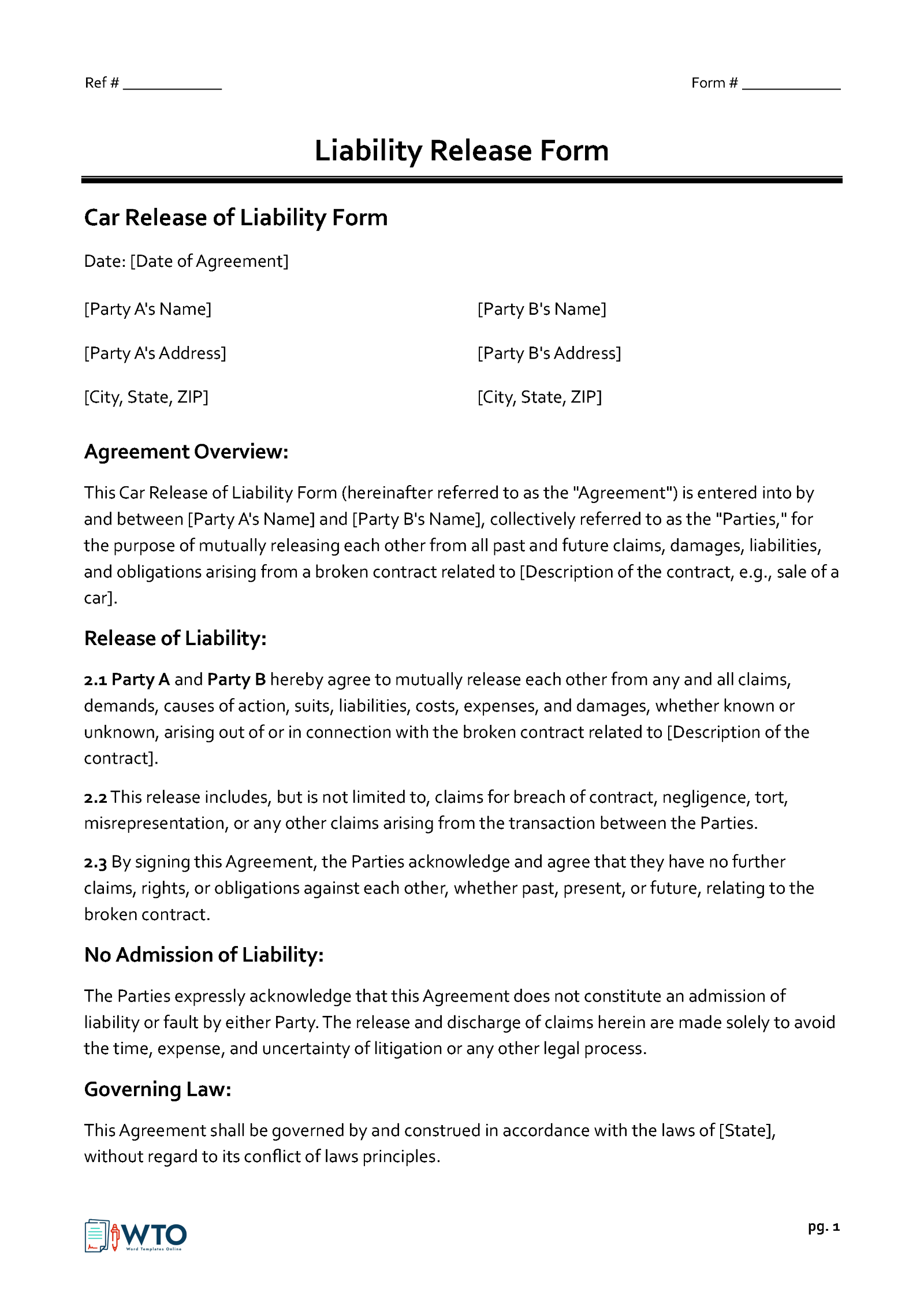
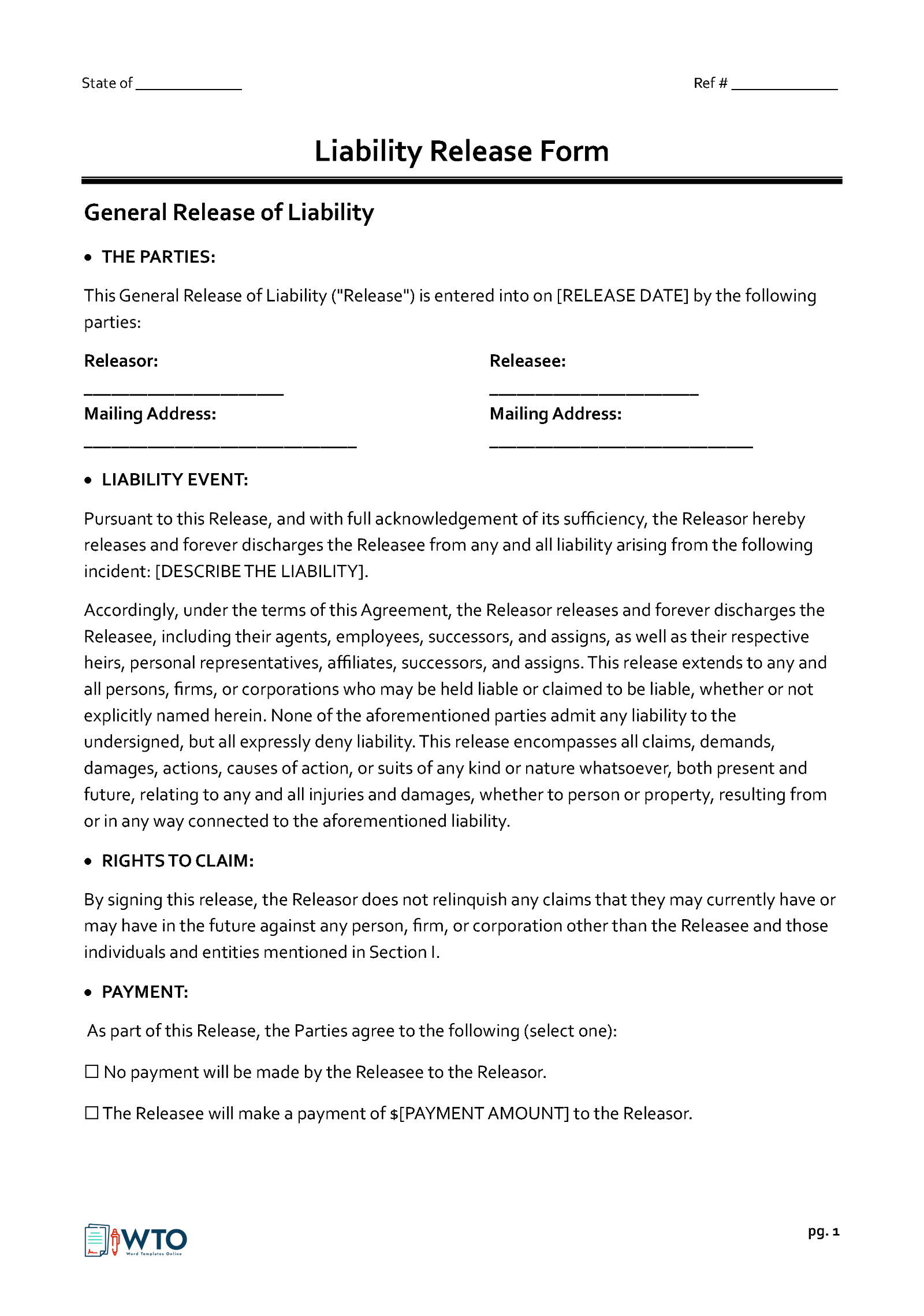
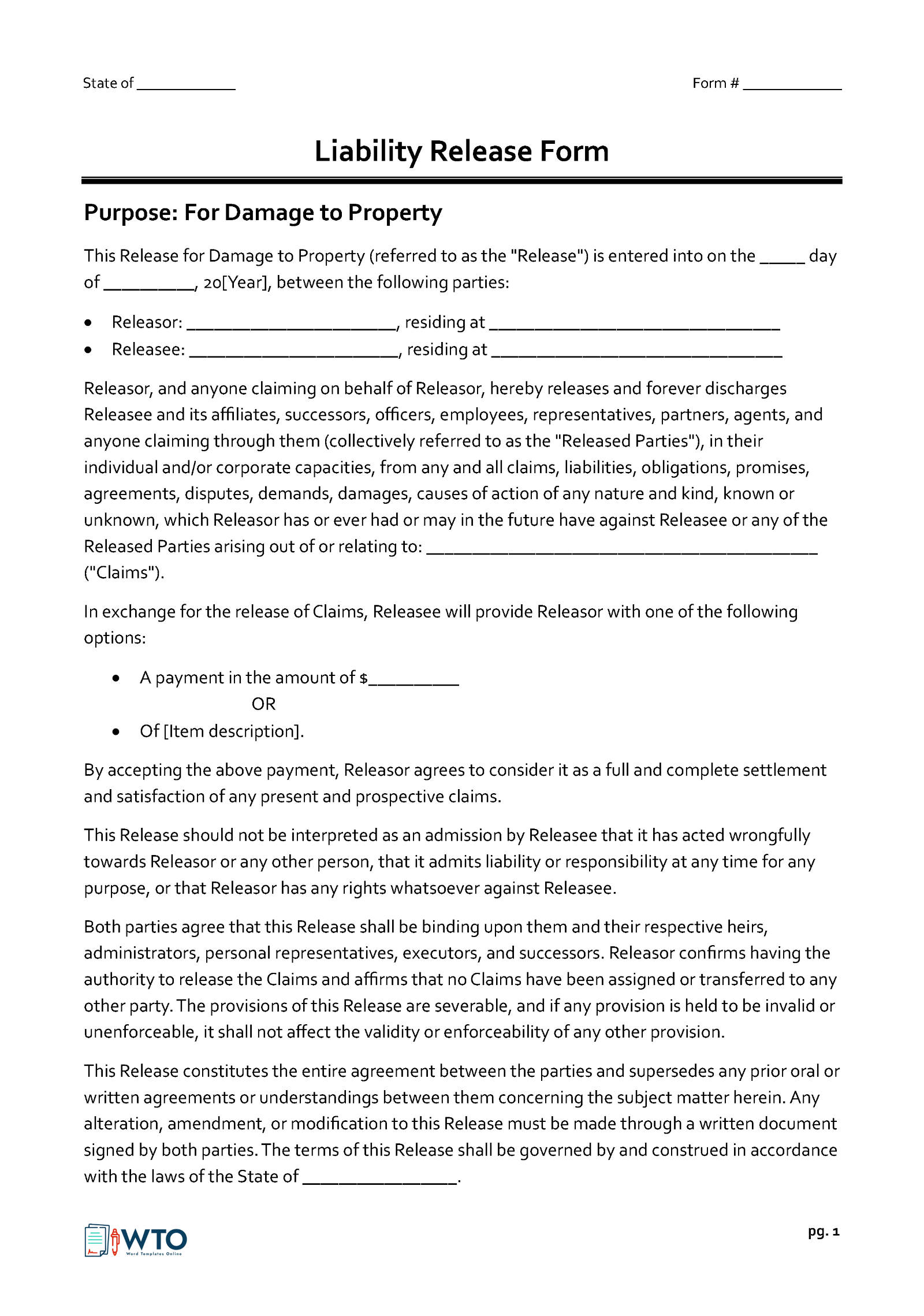
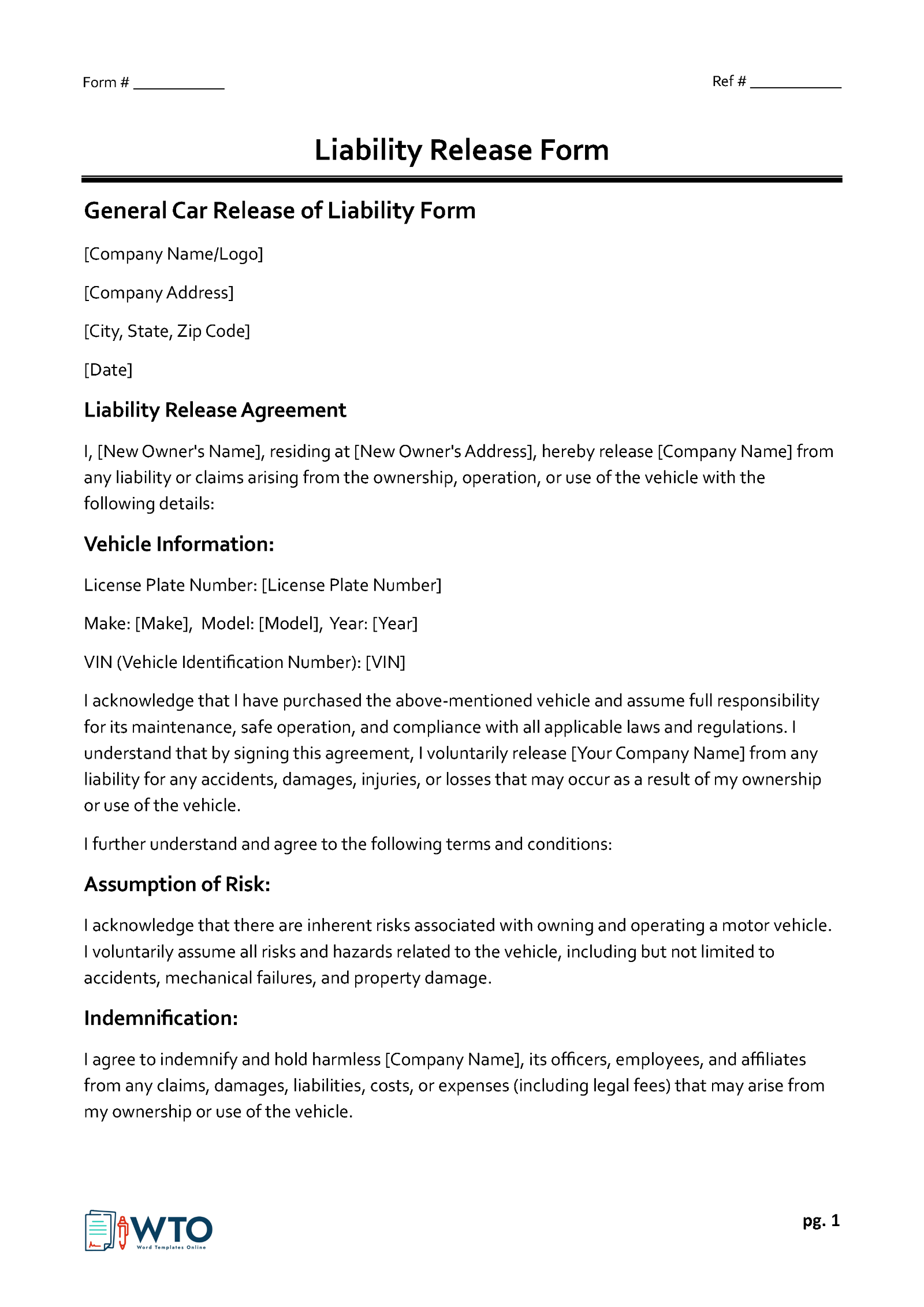
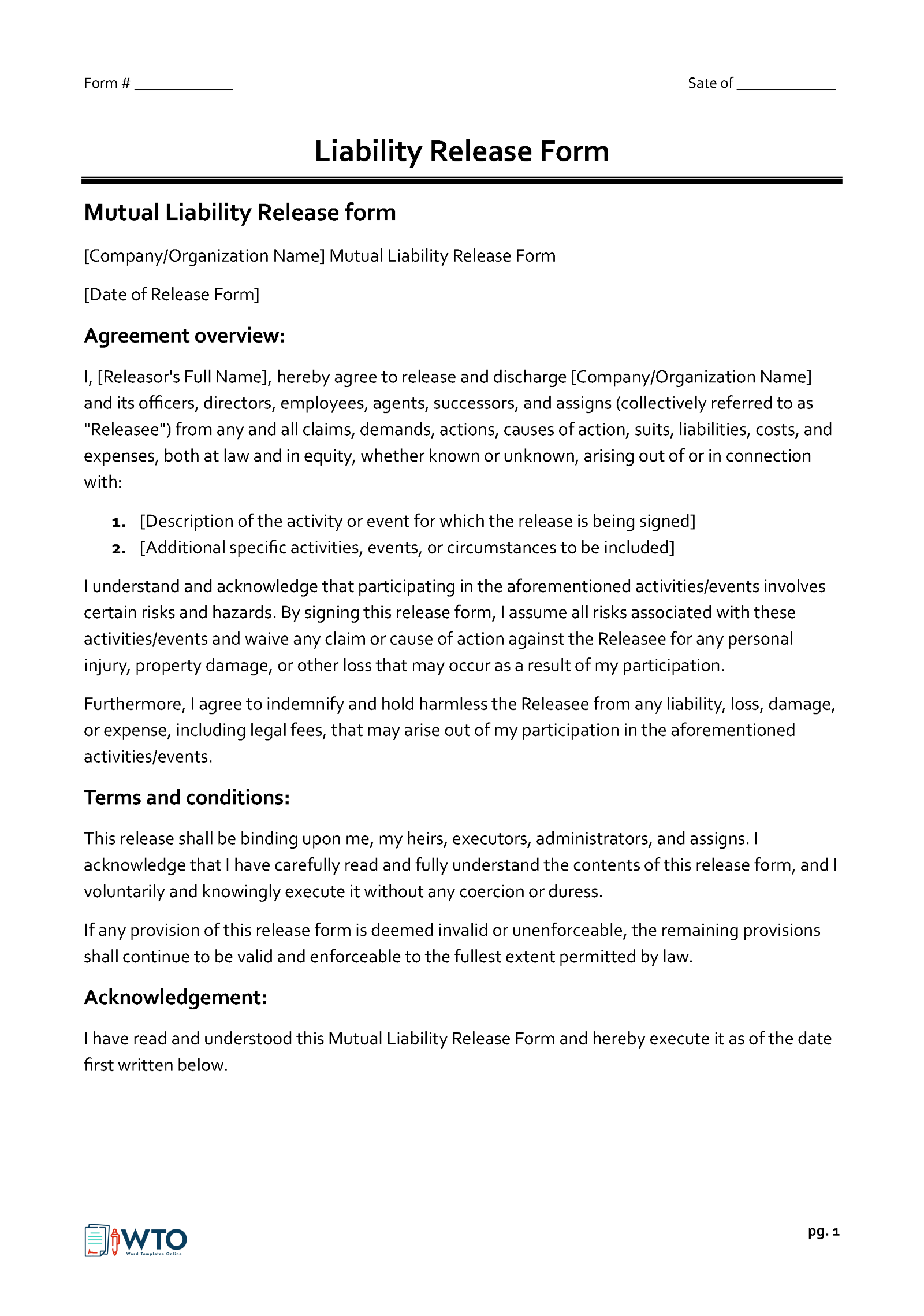
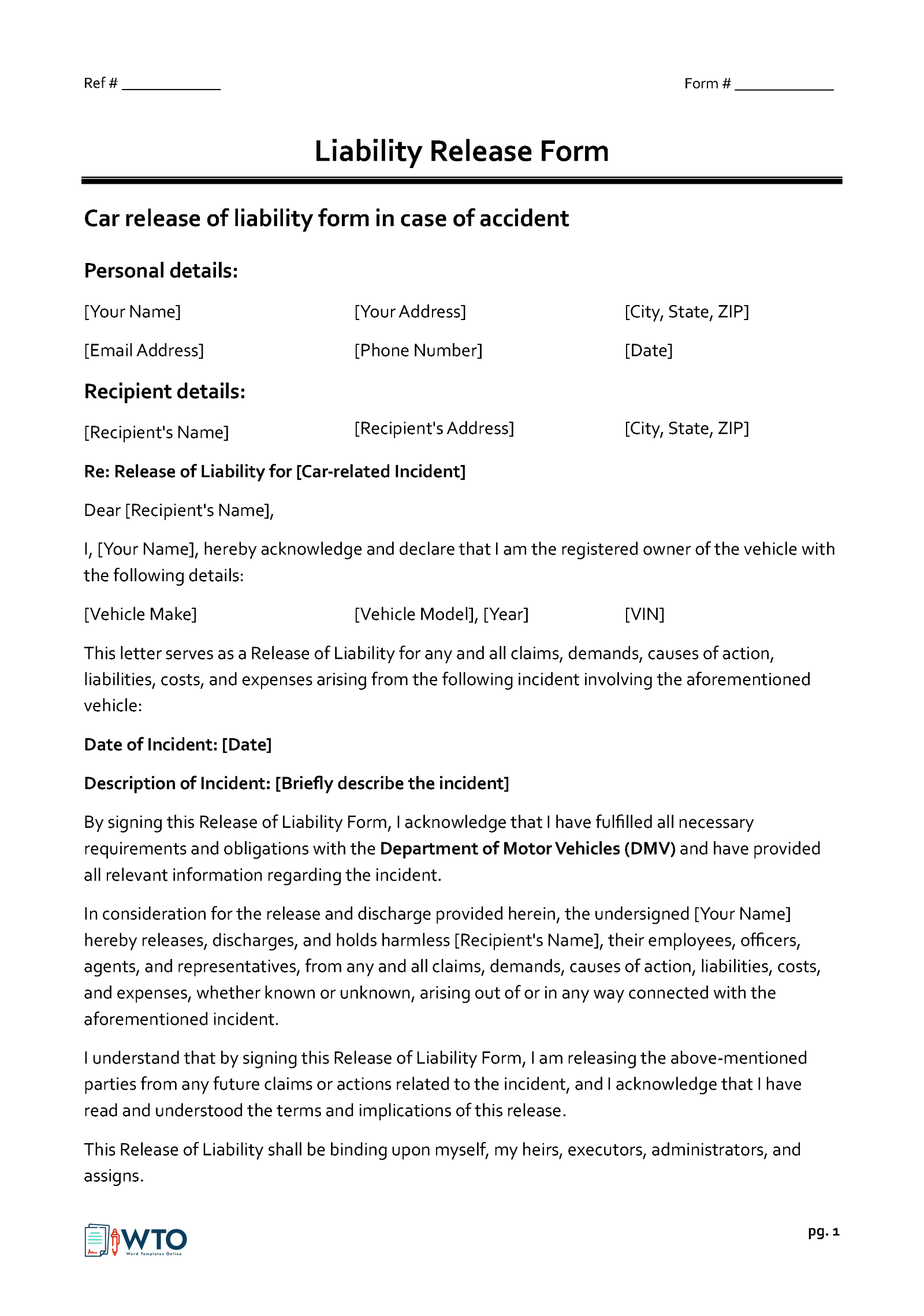
Where to Obtain a DMV Release of Liability Form
You can obtain the form from your state’s Department of Motor Vehicles website or collect a physical form from their local office. In some states, you can request the form via phone or mail.
Below are steps to obtain the form via the mentioned methods:
Website
Visit your state’s DMV website, go to the forms and publications page, and locate the appropriate document. The form may be titled Release of Liability or Notice of Transfer. Once identified, download and fill it.
Local office
To request a physical copy, go to the local DMV office and ask for the form. It is advisable to carry your identification and vehicle registration documents as proof of vehicle ownership at the time of sale.
Call or email
You can also request the form by calling your state’s DMV or emailing your request. You can obtain the DMV contact information on their website.
However, note that all these request options may not be available in all states, so confirming whether this service is offered in your state DMV is necessary. It is advisable always to review your state-specific requirements and guidelines. Also, ensure to select the correct form and complete it correctly to avoid issues during the process.
note
The Insurance Information Institute reports that auto liability is compulsory in every state, excluding New Hampshire. However, this insurance does not automatically protect you from liabilities after the vehicle sale. Therefore, it is greatly important to ensure the release of form is completed accordingly, as it can protect you should issues arise after the sale or ownership transfer.
Note that you can create your customized form using templates. You can download such a template online for free and use it as a guide on how to word and format the document. However, ensure that the form complies with the state-specific guidelines. You can consult an attorney where needed.
Notice of Transfer Vs. Release of Liability Form
In some states, a notice of transfer is similar to a form of release. For example, in Texas and California, these two documents have been combined into one single document referred to as the “Notice of Transfer and Release of Liability.” In other states, sellers are only required to file a Title Transfer Notice.
However, release notice can still be filed if the seller continues to receive tax documents or tickets associated with the sold vehicle after they have filed the Title Transfer Notice. Each state will typically have its specific title transfer requirements, and you are responsible for reviewing them after a car sale.
Final Thoughts
When selling a car, it is important to notify your state’s DMV that you have transferred its ownership and intend to release your liability for any issues associated with the vehicle. This protects you by officially and legally absolving you of any legal or financial liability should the new owner cause any accidents. Each state will have its specific release of liability form, so always check the local DMV’s website to download the right form. Also, you can consult general templates and samples to understand how to format and word such a document should you wish to craft a personalized liability release waiver.








